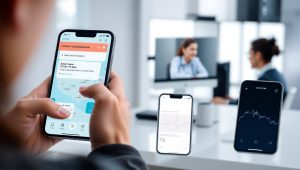
The COVID-19 pandemic has transformed nearly every aspect of daily life, presenting unprecedented challenges for individuals, healthcare systems, and governments. However, in the face of this crisis, the rise of digital tools has played a crucial role in mitigating the spread of the virus and safeguarding public health. From contact tracing apps to telemedicine services, digital tools have proven to be valuable assets in the fight against COVID-19. These tools help people stay informed, monitor their health, and maintain social distancing, making them essential in controlling the virus’s spread.
Contact Tracing Apps: Helping Identify and Notify Exposures
One of the most widely adopted digital tools in managing COVID-19 is contact tracing apps. These apps track the movements of users and, with their consent, can alert them if they’ve come into contact with someone who has tested positive for the virus. By alerting individuals about potential exposure, these apps allow them to take immediate action—such as self-isolating, getting tested, and monitoring symptoms—helping to prevent further transmission.
Countries around the world, including Australia, Singapore, and several European nations, have implemented their own versions of contact tracing apps. The apps rely on Bluetooth technology to record proximity between users, ensuring privacy by not collecting personal data. As more people download and use these apps, they become an invaluable tool for breaking the chains of transmission and preventing future outbreaks.
Telemedicine: Virtual Healthcare for Safety and Convenience
In the face of lockdowns and social distancing guidelines, telemedicine has emerged as a game-changer for healthcare delivery. Telemedicine enables patients to consult with healthcare providers remotely, via video calls, phone calls, or even messaging services. This technology allows individuals to seek medical advice, get prescriptions, and even receive mental health support without leaving their homes.
By reducing in-person visits to clinics and hospitals, telemedicine plays a critical role in preventing the spread of COVID-19. Patients can receive guidance on symptoms, treatment plans, and follow-up care while staying safe at home. For those with chronic conditions or mental health concerns, telemedicine has ensured that their healthcare needs are still met, even during periods of isolation or limited access to physical healthcare facilities.
Health Monitoring Apps: Tracking Symptoms and Promoting Self-Care
Health monitoring apps are another powerful tool in the fight against COVID-19. These apps allow users to log symptoms, track their health status, and receive guidance on when to seek medical care. Many health monitoring apps integrate with wearables, such as smartwatches or fitness trackers, to provide real-time data on vital signs like heart rate, blood oxygen levels, and temperature.
By tracking their symptoms, users can assess whether they are at risk for COVID-19 or whether they need to be tested. In many cases, these apps provide recommendations based on reported symptoms, helping individuals understand their risk level and take appropriate precautions. Some apps also integrate with local health authorities, enabling users to receive updates on local COVID-19 outbreaks, vaccination clinics, and other resources that can help keep them safe.
Online Vaccination Platforms: Scheduling and Managing COVID-19 Vaccines
As vaccines have become a key tool in ending the pandemic, digital platforms that manage COVID-19 vaccinations have become essential. Online vaccination platforms allow individuals to schedule their vaccination appointments, track vaccination sites, and receive reminders for follow-up doses. These platforms ensure a streamlined process for distributing the vaccine to the public, making it easier for individuals to get vaccinated quickly and safely.
Many platforms are also integrated with public health systems, allowing users to access digital vaccination certificates, which may be required for international travel or attending public events. By digitizing the vaccination process, these platforms help to ensure equitable access to vaccines, streamline logistics, and encourage widespread vaccination, ultimately aiding in the global effort to combat COVID-19.
Social Media and Awareness Campaigns: Spreading Information and Combatting Misinformation
Social media platforms have become powerful tools for spreading vital information about COVID-19. Governments, health organizations, and experts use social media to share updates on the virus, preventive measures, and vaccination campaigns. During the pandemic, social media has helped keep the public informed about new guidelines, safety protocols, and health recommendations.